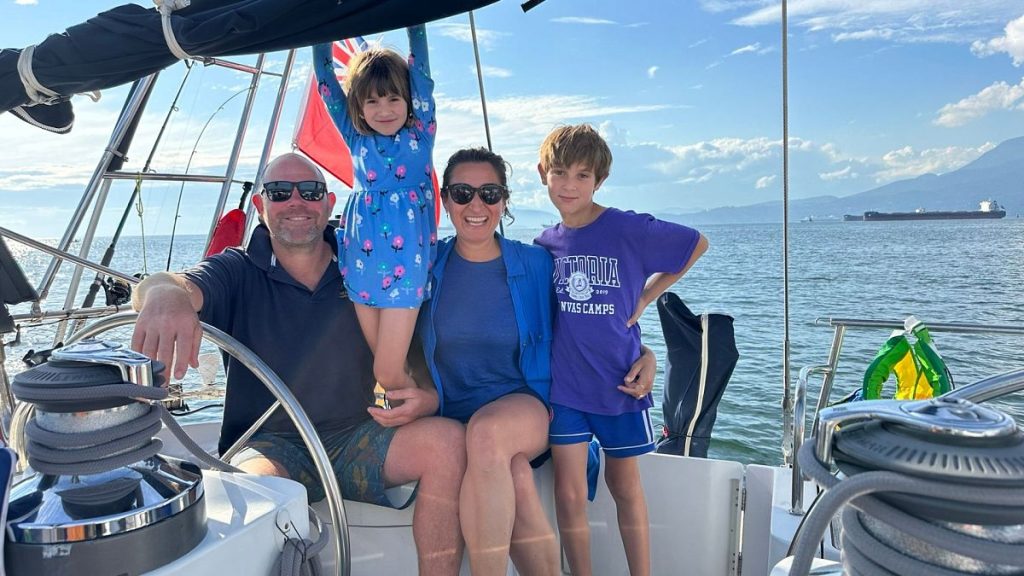Larissa Clark and Duncan Copeland, driven by a shared passion for sailing and a desire to instill a love of nature in their two young children, embarked on a multi-year circumnavigation of the globe in July 2024. This dream, born during quiet nights of the COVID-19 lockdown, transformed from pinning locations on a map to a reality aboard their 50-foot sailboat, “Freeranger.” Leaving behind their settled life in Canada, where Duncan worked to combat illegal fishing, the family embraced the unpredictable nature of the ocean, seeking a life-affirming experience beyond their comfort zones.
Their journey thus far has been a tapestry of exhilarating encounters and challenging moments. From paddling away from a crocodile lurking beneath their dinghy in a Mexican mangrove estuary to witnessing a Sei whale, the third largest in the world, dive beneath their boat off the California coast, the family has embraced the unpredictable nature of their oceanic classroom. These moments of adrenaline are interspersed with the awe-inspiring beauty of migrating humpback whales and the humbling task of untangling discarded fishing nets in great white shark breeding grounds. Each experience, whether thrilling or demanding, weaves into the rich narrative of their extraordinary adventure.
The Copelands’ voyage extends beyond personal exploration; it’s a mission driven by a deep commitment to ocean conservation. Before setting sail, they established Free Range Ocean, a non-profit organization dedicated to promoting citizen science and marine research. Their flagship project, the Ocean Citizen Science Project directory, endorsed by the UN Ocean Decade, connects individuals worldwide with research projects, enabling anyone, regardless of location, to contribute to understanding and protecting our oceans. From families surveying invasive species on beaches to tourists sharing whale sightings, the directory empowers individuals to become active participants in ocean conservation.
The family actively contributes to this mission, participating in various citizen science initiatives. They’ve aided researchers in British Columbia by tracking whale populations and supported UK scientists studying climate change’s impact on phytoplankton. “Freeranger” also serves as a testing ground for sustainable maritime technologies, reflecting their commitment to environmentally responsible sailing. The boat itself, equipped with solar panels and multiple cabins, is designed for both family life and hosting researchers and communicators, further solidifying their dedication to collaborative ocean stewardship.
Preparing for such an ambitious undertaking required extensive preparation and training. The Copelands immersed themselves in sailing communities, acquiring certifications in essential skills like offshore first aid and boat electrics. Recognizing the importance of interpersonal dynamics on a long voyage, they even completed a workshop on the psychology of cruising for couples. This proactive approach allowed them to anticipate and navigate the challenges of confined living and shared decision-making, fostering a harmonious environment for their family.
Daily life aboard “Freeranger” is a blend of structured routine and spontaneous adventure. Homeschooling, facilitated by a Canadian program, takes precedence in the mornings, while afternoons are dedicated to exploration, socializing, and boat maintenance. The family embraces a minimalist lifestyle, prioritizing local and seasonal shopping and utilizing low-impact cleaning products. They generate their own drinking water and rely on a Starlink internet connection for communication and Larissa’s continued management of her PR business and travel company. While weekends have become a fluid concept due to the unpredictable nature of weather, the family has found a rhythm that balances responsibility with the freedom to explore the world’s oceans.
The Copelands’ journey continues to be punctuated by awe-inspiring wildlife encounters. From gray and humpback whales off Baja California to swimming with whale sharks, they have witnessed the breathtaking biodiversity of the ocean. Land excursions provide opportunities to observe black bears, sea otters, and various bird species, enriching their understanding of the interconnectedness of marine and terrestrial ecosystems. These experiences reinforce their commitment to conservation, reminding them of the importance of protecting these fragile environments.
Looking ahead, the family anticipates their most challenging offshore passage yet: a month-long journey to the remote Pitcairn Islands in the South Pacific. This leg of their voyage represents a significant step in their circumnavigation, testing their resilience and seamanship. As they continue their adventure, the Copelands remain committed to sharing their experiences and inspiring others to engage in ocean conservation. Their story is a testament to the transformative power of exploration and the importance of citizen science in understanding and protecting our planet’s oceans.














